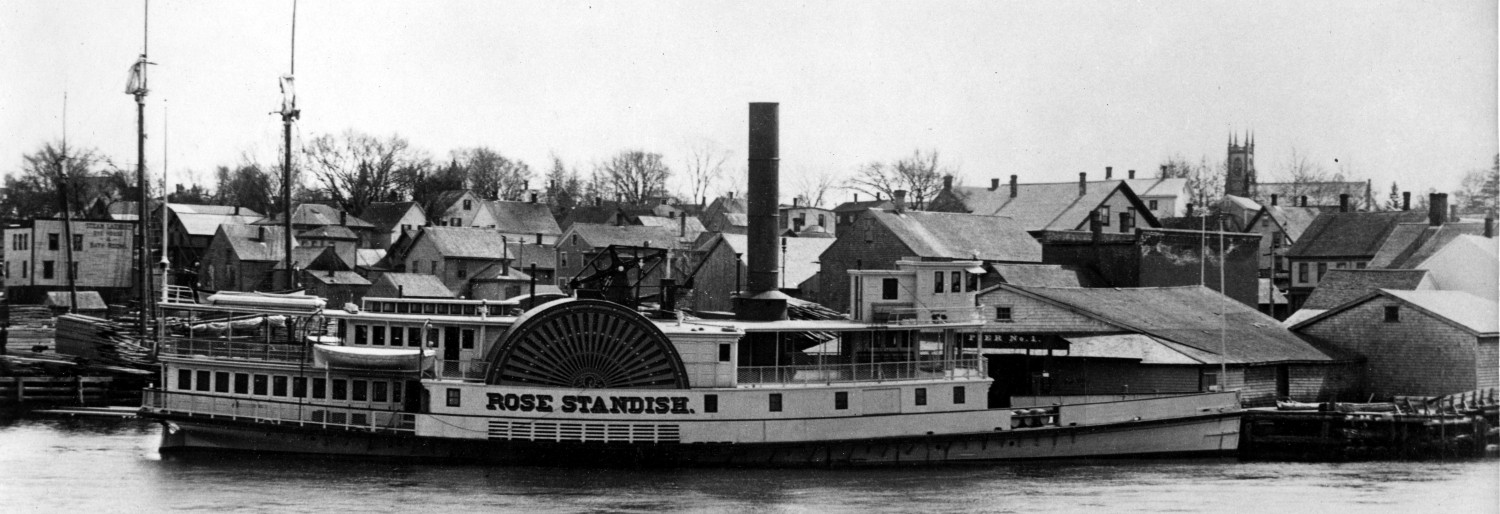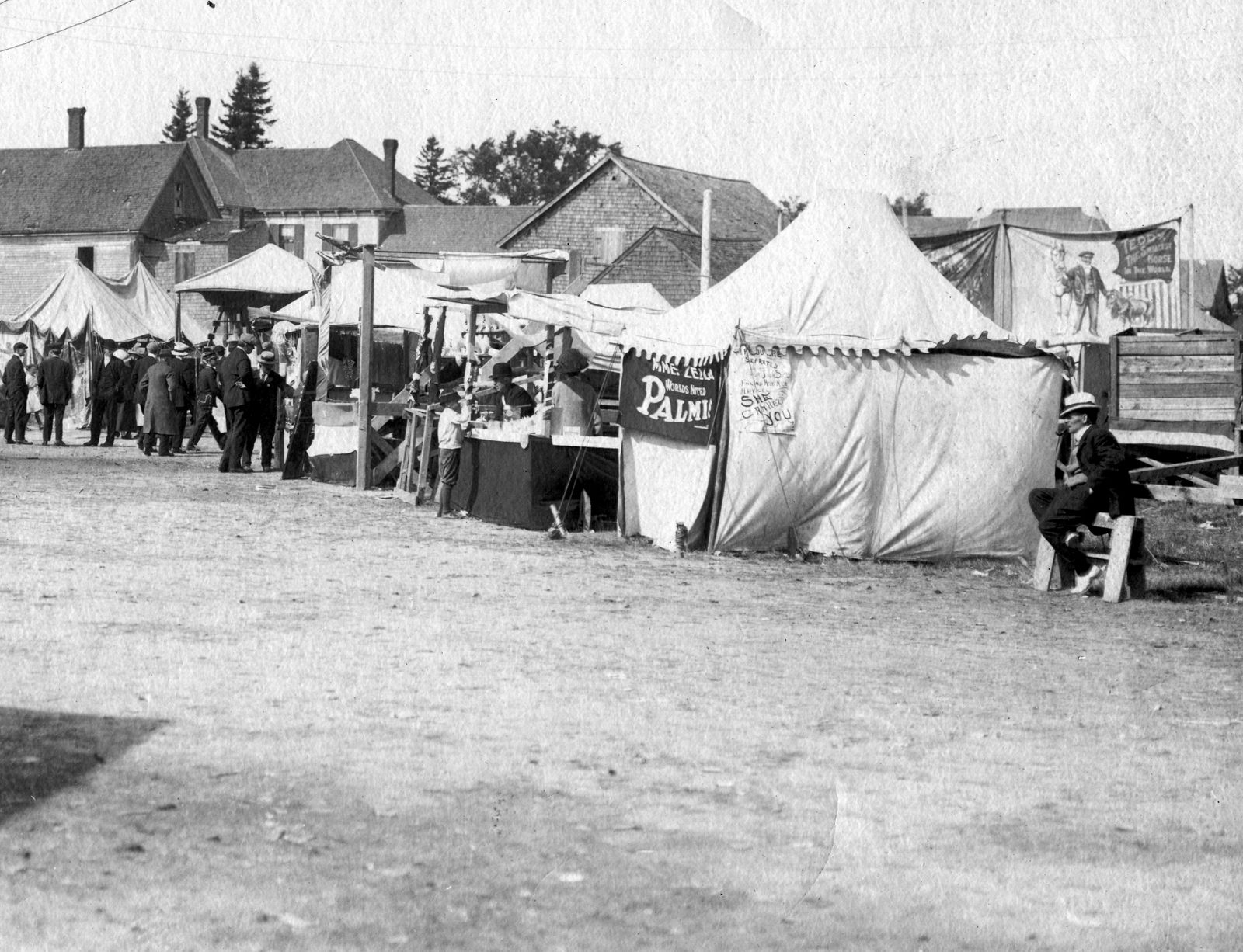Bands of gypsies or tribes as they are sometimes called began to arrive in Maine and probably Downeast just after the Civil War if not earlier. Being wanderers they never settled permanently in one place but during their migrations we know they took up temporary residence in Calais, Princeton and Pembroke during the spring and summer, relocating to warmer climes in the winter much as snowbirds do today.

Wikipedia claims the first Romani groups to arrive in the United States came from England in 1850 but the above Bangor Whig and Courier article of 1843 establishes some arrived much earlier.
Bangor Whig and Courier September 16th, 1843
The ship America, Captain Cassin, which arrived at Baltimore on Monday last, brought the first specimens of the gypsy race ever seen in that city. The Sun says:- the group consists of William Wegner, the father, and five children. Those who have studied the character of Meg Meriles will perhaps be curious to see a part of the people to whom she was queen. They are formed like other human beings, and speak a language resembling Dutch. The girls have jet black hair which falls in a neglected style over their shoulders.
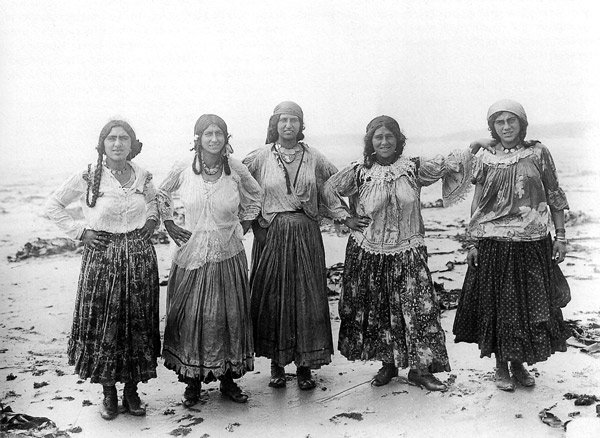
Gypsy women Biddeford about 1900
The fact the Wegner family was described as “formed like other human beings” gives us some idea of the misconceptions about gypsies in the 1800’s, some of which are still prevalent today. The gypsies ancestral home was in northern India and as people they adopted a peripatetic lifestyle many centuries ago. Because this lifestyle differed so dramatically from that of most Americans, many myths about gypsies became accepted truth such as the claim they kidnapped children which though widely believed was simply not true.
An article in the Saint Louis Globe and Democrat of April 24, 1887 provides an early and sympathetic view of gypsies and is the first we find with a local connection. The paper describes a band of gypsies passing through Missouri:
These are the gypsies that revel in the open fields, the woods, the skies, the winds, the flowers, the birds. And these are the gypsies whom I have, in instances, found nobler than Christian men, wiser than learned men, truer than trusted men, more loving than all men. While they prey upon the Giorgio in the most romantic manner permitted to man, they are of an ancient ancestry that holds precious May-Day memories. So it is that today throughout America thousands upon thousands of these wandering folk are leaving their winter homes in the north or their winter roots in the South and the southern portions of our central tier of states, from the Carolinas to San Diego County California, and are preparing for their springtime migrations to the annual May time reunions and thence upon their zigzag summer through wanderings as far north as Portland Oregon, Saint Vincent, Dakota, Lake George, the White Mountains and above Calais in Maine as well as to their remotest boundaries of New Brunswick and Nova Scotia.
We do know Pembroke was home to a band of gypsies in 1887 because the Champaign Illinois Gazette of September 6, 1887 describes a band traveling from Braunfels, Texas to Pembroke to visit the Pembroke tribe.
The Gypsies Custom of Visiting
“Visiting” is in great favor with them. When two or more camps are contiguous this is kept up unceasingly in the winter quarters it is constant, and I have known families and bands travel from New Braunfels Texas to Pembroke Me more than 2500 miles by road to “visit” another band comprising relatives and a few friends who had but recently landed in this country from England.
“Pretty George” his mother and two sisters over there in the handsome wagon nearest the brook live in Ohio and own several farms there. Brewer is a land owner in southern Indiana. Both these and their families are visiting “Uncle Job” who is very rich and lives in Vermont. Last year the affair was reversed and “Uncle Job” with his large family and splendid wagons traversed the pleasant roadsides of Ohio while his camp is daily visited by scores of wealthy Gypsies from Boston. One family the Coopers, the rich horse traders of East Somerville Boston, have two fine houses alongside their stable and the entertainment here at the camp is returned there in what would be pretty comfortable style for anybody. It must not be imagined that the Romany are all poor. I can give you a list of them worth $40,000,000 and I have many a time eaten meals with them served on the costliest of China while the Reynolds and Stanley families have many a time been my hosts when our food has come upon the greensward in solid silver service.
Edgar L Wakeman’s Letter
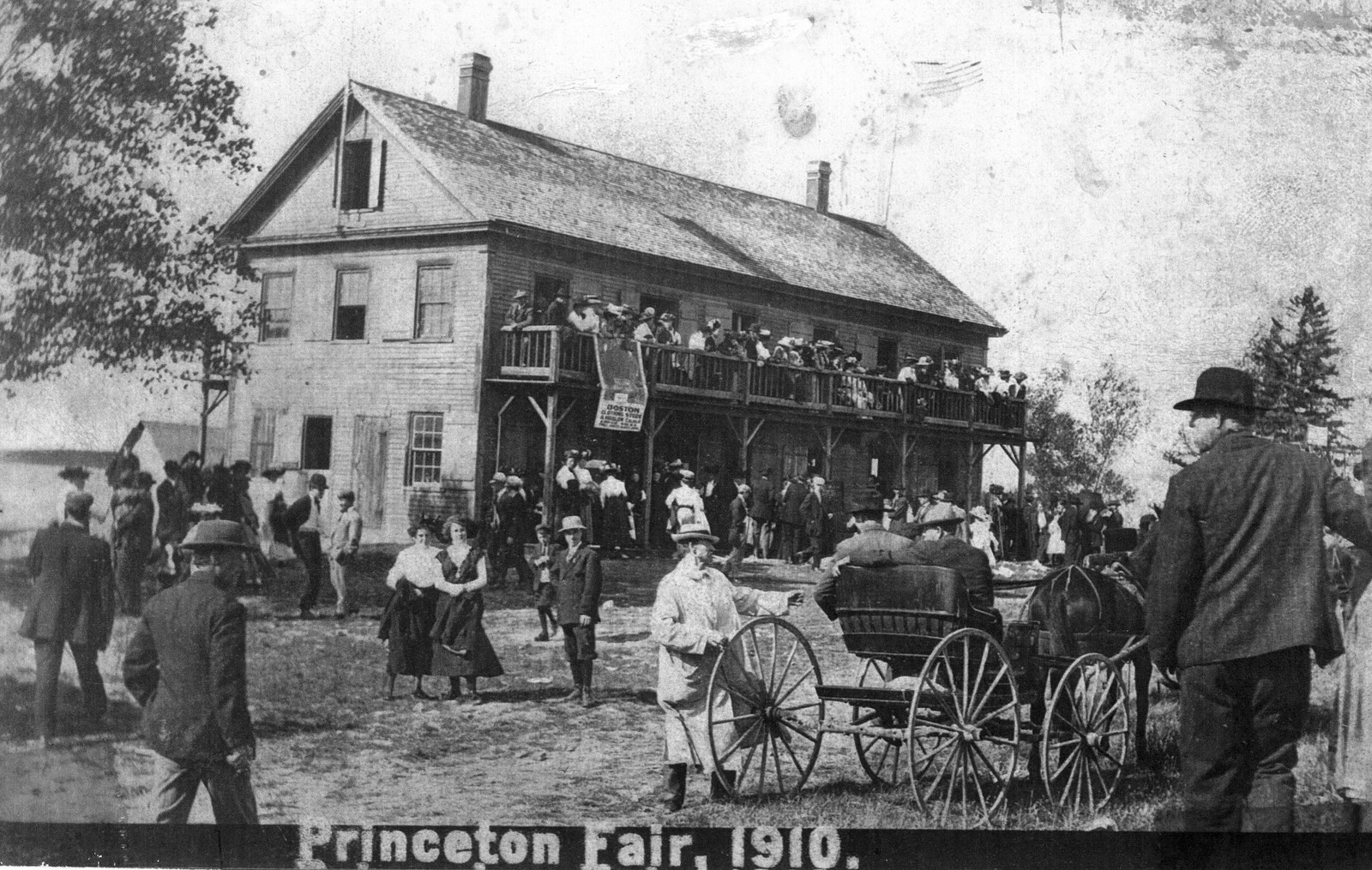
Gypsies fortune tellers were a common feature at local fairs
The attitude toward gypsies and the local’s perception of them could however differ dramatically from that of Edgar Wakeman in Illinois. Every summer a gypsy band encamped in Princeton and Belmore’s history of Princeton provides a less edifying view of the gypsies:
Belmore’s Princeton history probably describing events about 1900:
At the time under consideration fewer Indians than to-day lived just over the bridge; and most of them had their cabins on the north side of the Houlton road. Trees and bushes on the lakeside of the road made it a lovely site for campers. Here every summer a band of gypsies encamped. These wanderers lived on the toil of hard-working stay-put citizens; their arrival in town called for special attention to hens, garden-truck, and other things loose or easily uprooted. One day Flo Belmore and Georgie Rolfe, Put’s adopted daughter, went over the bridge to have their palms read. The vixens gave Flora a glowing reading, but for poor Georgie they decreed a gloomy future, including among other damnations blindness before death. As the writer followed the lives of these two women down through the years, he often wondered how much of what those slovenly gypsies told the impressionable young Flora and Georgie had to do with the fulfillment of those prophecies. On the way over Flora had the key to her new home dangling on her finger; on her way back she discovered that it was lost. The girls reported the loss to the gypsies and were told exactly where the key would be found; and they were right. This rather startling display of occultism must have heightened the effect of the gypsies’ prophecies.
In truth the image of the gypsy as a thief of children, money or hens is either completely untrue or greatly exaggerated. Local rubes taken in by gypsies in games of chance at the fair were likely to accuse gypsies of all sorts of criminality. Still in many communities their arrival was welcome as gypsies were crafters, artisans and metal workers of great ability. Those with pots, pans, buckets and other useful items in need of repair relied on gypsy skill to put them right and their mastery of all things equine was legendary. There is little evidence gypsy bands roamed the area near their encampments stealing from the locals although anything missing after their departure was certain to be attributed to the tribe.
Gypsy palm readers and fortune tellers could be found at most of the summer and fall fairs and it is possible the odd farmer’s pocket was relieved of a few coins by the children and menfolk of the tribe but Crawford farmers were no less disreputable. Consider this article which appeared in September 1932 in the Boston Globe:
GYPSY PRINCESS ROBBED BY CLIENT
Pocket Picked While She Told Man His Fortune
Special Dispatch to the Globe
CALAIS, Me, Sept 21
A caravan of gypsies with several gaudily-garbed women and many children drove into town last night and pulled up at the police station. With much gesticulation and lamentation, one of the women told the chief that they had been robbed in Crawford, a nearby town.
It seems that the gypsy Princess, the best fortune teller on the road, was telling a native “farm man” all about the good luck in store for him, which he verified by picking the pocket of the Princess of “very mucha money;” O, yeah?” replied the officer on the desk skeptically. “What did he look like?”
The description, however, tallied exactly with that of a Crawford citizen known to be as “slick as they make em”, something of an amateur magician. The police then became sympathetic but told the gypsies that Crawford was out of their jurisdiction. They advised them to go to Machias and tell Sheriff Cummings all about it and “he would use them right.”
This advice was received with more wild gesticulations and expostulations. Sheriff Cummings was the last man on earth they wanted to see, for he had been chasing them from town to town all summer, and had arrested several light-fingered members of the band for robbing patrons and had made them disgorge. At last accounts the Princess was muttering terrible curses on the “farm man.” As far as the Calais police are concerned the incident appears closed.
Glendon Ayer recalls the gypsy encampment in Calais was on the corner of South and Garfield Streets across from the cemetery in the early 1900’s. Gypsies, he says, were “always around” for celebrations and fairs in those days.
The Eastport Sentinel carried reports as early as 1882 of bands of gypsies camping “near the Redoubt” and in 1910 the Sentinel reported:
A large band of gypsies visited this city the latter part of last week, and encamped on the lot just beyond the Carrying Place. During the days they visited the city, telling fortunes. Unfavorable reports having been learned by the authorities regarding them, they were advised to quit the city, which they did very reluctantly on Saturday last.Local officials often exceeded their legal authority and forced gypsy bands to move on based solely on complaints from locals.As late as 1957 a band of gypsies was summering in Red Beach where they found their welcome less than friendly.
Rutland Vermont Herald May 20, 1957
50-Man Band of Gypsies Escorted Out of Maine
Authorities Act After Many Reports of Pilfering.
CALAIS, Maine, May 19
A 50-man band of travelers was escorted out of Maine today because authorities said they had received several reports of thefts and pilfering from places where the group had stopped.
State police said the group consisted of gypsies calling themselves Cherokee Indians. Their motor vehicles bore North and South Carolina registration plates.
Dep. Sheriff Maurice Worcester, turnkey at Washington County Jail said law officials ordered the band out of the state rather than take normal legal proceedings because there were too many involved-“our jail wouldn’t hold them all.” The band, including many children, traveled in 12 vehicles and four house trailers. The all-night exodus started at Red Beach near here, latest stop for the touring group. Sheriff departments and State Police escorted the caravan to the New Hampshire border at Kittery.
We can only speculate, of course, on whether this group of gypsies had engaged in “thefts and pilfering” as claimed by the authorities or whether locals simply objected to their lifestyle. According to the authorities many in the gypsy band were involved in criminal conduct but had there been evidence of the alleged thefts, charges would almost certainly have been brought. The fact that the authorities elected to disregard “normal legal proceedings” and escort them to the state line cannot help but create a suspicion that the band’s crime was being gypsies.

Calais Waterfront about 1900, cupola to right on top of Opera House, corner Church and Main streets
The mysticism and other worldly habits and beliefs of gypsies were strange to Downeasters but they are probably no stranger than the myths and superstitions of Downeast fishermen. The list of superstitions associated with deep water sailing is lengthy and sometimes puzzling. It is bad luck for a sailor to say the word pig when on board, wearing a single gold earring protects a sailor from drowning, disaster will follow if a sailor steps on board with left foot first and don’t look back once your ship has left port are just a few. On the other hand black cats are considered good luck. Most importantly don’t whistle in the direction of the wind.
If you happen to be launching a ship it is recommended you do so in dry weather and never, ever christen your ship with a bottle of water colored with molasses as was the case with the Freddie Eaton, built and launched in 1874 in Calais for the Eaton lumber company.
The San Francisco Examiner of September 2, 1934 tells us why.
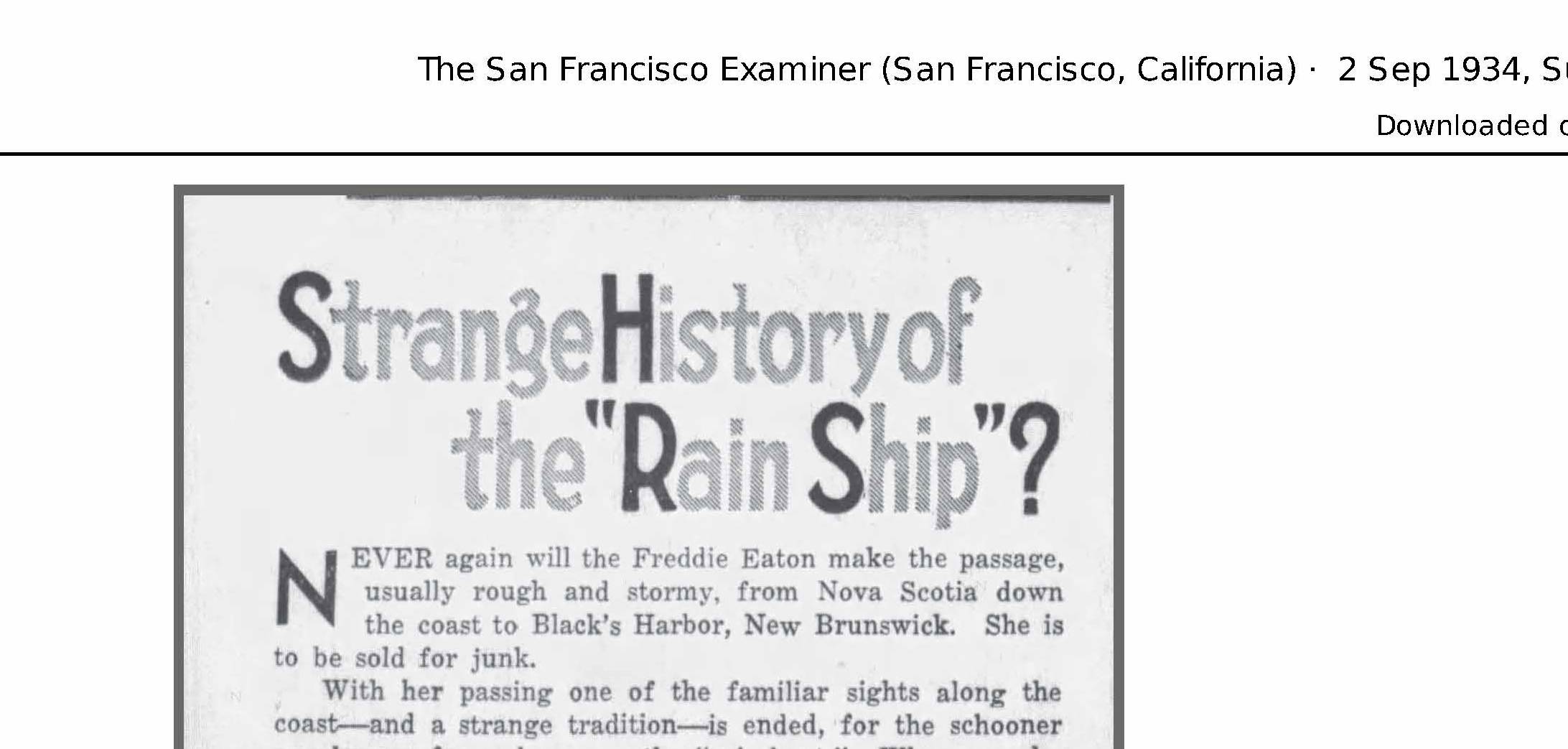
NEVER again will the Freddie Eaton make the passage, usually rough and stormy, from Nova Scotia down the coast to Black’s Harbor, New Brunswick. She is to be sold for junk.
With her passing one of the familiar sights along the coast and a strange tradition is ended, for the schooner was known far and near as the “rain-boat.” Whenever she sailed into Black’s Harbor the good folks of that coastal community went scurrying after rubbers and raincoats. “A wet week-end it will be,” they used to say.
The presence of this boat was as sure a sign of rain as the government weather signals. The vessel was launched in 1874 at Calais, Maine, in a driving rainstorm. Sometime later it was learned that the bottle of good old New England rum intended for the christening had been drunk by a shipyard foreman who then refilled it with water colored by molasses.
“She’ll always run to water,” sagely nodded the wiseacres which she did in more ways than one.
For a good many years the Maine Coast, too, had a “rain boat” known as such from Eastport to Kittery. This was the little coasting schooner Donna T. Briggs whose hull was always painted a bright blue. The appearance of this blue boat is remembered by all old-timers as being an absolute guarantee that rain would soon fall. And it always did. Despite the fact that the Freddie Eaton and the Donna Briggs were admittedly “rain boats” both proved paying properties for their owners, although they brought storms in their wakes.
Stories about strange ships associated with weird superstitions are abundant in all marine countries, and many of them are based on the classic “Flying Dutchman,” but no section has more legends than the New England coast. This is perhaps because so many strange things really have happened to ships in that section.
Finally a couple odd and interesting reports from the national papers:
In 1937 many national papers reported a United Press story titled “Neither Smith nor Jones.”
Eastport, Me (U.P.)- This city of 4000 population has neither a Smith nor a Jones listed in its telephone directory.
In 1953 the UP circulated this amusing item:

John “Jack” Dudley was the District Court Judge in Washington County for many years
